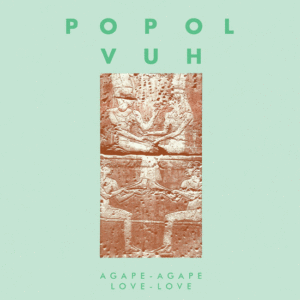Popol Vuh
Agape-Agape Love-Love (8/10)
Spirit of Peace (9/10)
ONE WAY STATIC
Of all the disparate figures grouped incongruously under the “Krautrock” banner, none sought spiritual sanctification as fervently as Popol Vuh founder and leader Florian Fricke. Two recent reissues, of 1983’s Agape-Agape Love-Love and 1985’s Spirit of Peace, confirm his desire to create truly devotional music—expressive, processional, and buoyant.
Though the classically trained Fricke had access to a Moog synthesizer in 1969, before most of his experimental German rock peers, he didn’t tarry long in the electronic scene that birthed Tangerine Dream and Kraftwerk. Passing his synth off to Klaus Schulze, he turned his focus to organic sounds, interlocked electric and acoustic guitars, pulsing piano, and chanted vocals, influenced by sacred texts, global sounds, and the American free jazz of John Coltrane and Pharoah Sanders and the minimalism of Terry Riley and Erik Satie. “Florian was all his life very interested in the spiritual nature of men and he saw his music always as a contribution on this field, from the very beginning,” Fricke’s widow, Bettina Waldthausen, told Perfect Sound Forever in 2013 “…I believe Florian’s deepest wish was to touch the heart.”
The ’70s found Popol Vuh blending stately drones with florid, impressionistic rock music, incorporating elements of what would later be defined as “world music,” drawn from global motifs and scales. Even as the band aligned itself with director Werner Herzog, soundtracking films like Aguirre, the Wrath of God and Nosferatu, the director’s own examinations of darkness never consumed Fricke, whose music grew increasingly ecstatic as the years went on.
By the early 1980s, Fricke had a stateside parallel in the American new-age music movement. Populated by musicians from backgrounds and traditions as disparate and disconnected as krautrock, “new age” was and remains a nebulous term. But it’s abundantly clear listening to recordings like “Why Do I Still Sleep” and “Spirit of Peace” why listeners seeking mind-expanding music to accompany meditation practices and yoga might turn to Popol Vuh. With his tender sonic touch and pan-religiosity—which drew freely from Christian mysticism, Mayan scriptures, and Hinduism—Fricke’s music felt less like the fruits of a spiritual grab bag and more like an expression of pure cosmic plurality: a welcoming sonic temple built on multiple—even shifting—foundations, and open to all who cared to enter.
Bolstered by a choir chanting Byzantine scales, Agape-Agape Love-Love found Fricke under the influence of Sunni poet Rumi. Cyclical drones (“They Danced, They Laughed, As of Old”) sit alongside meditative percussion-based pieces (“Love, Life, Death”), and loping psychedelic rock (“Love-Love”). Most exciting is when Fricke and guitarist Conny Veit (the leader of cult psych-rock group Gila) meld together in a fashion not unlike Garcia/Weir or Verlaine/Lloyd. Following a dramatic intro of choir and bombastic percussion on “The Christ Is Near,” Fricke and Veit’s questing melodies take the song from a place of gothic solemnity to ascendant heights.
The band’s follow-up, Spirit of Peace, doesn’t aim for those same heights, offering instead quieter, more reserved soundscapes. Opening song “We Know About the Need” had appeared a few years earlier, in Werner Herzog’s 1984 mountaineering documentary The Dark Glow of the Mountains. In typical Herzog fashion, the film wasn’t so much about climbers Reinhold Messner and Hans Kammerlander reaching the tops of the Gasherbrum Mountains so much as exploring their inner reserve, their internal motivation. Likewise, Spirit of Peace steadies its gaze inward. The three-part title suite demonstrates why new age audiences found affinity with Popol Vuh; a steady, minimalist piano piece, it builds slowly, crescendoing with a soft flurry of arpeggios that wouldn’t sound out of place on an Alice Coltrane Impulse record. It’s one of Fricke’s most soothing and gentle triumphs.
Popol Vuh teamed again with Herzog for the soundtrack of 1987’s Cobra Verde, and Fricke led Popol Vuh throughout the ’90s, exploring Western classical music and world-beat electronica (check out the “mystic house” of 1995’s City Raga if you’re in a particularly curious mood) before his passing in 2001. But Agape-Agape Love- Love and Spirit of Peace represent the closing of Fricke’s most resonant era, capping off a run that found he and his bandmates effectively creating the most deeply-rooted sacred music in the progressive rock age. While theologians debate whether many paths lead to the same destination or many paths lead to many destinations, Fricke’s music was content to generously embody the spirit of one of Rumi’s most famous and expansive quotes: “All religions, all this singing, one song.”









